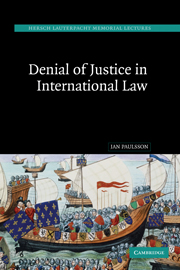Book contents
- Frontmatter
- Table of Contents
- Acknowledgements
- Authorities
- Abbreviations
- 1 The renaissance of a cause of action
- 2 The historical evolution of denial of justice
- 3 Three fundamental developments
- 4 The modern definition of denial of justice
- 5 Exhaustion of local remedies and denial of justice
- 6 Denial of justice by outside interference
- 7 Denial of justice by the decision-maker
- 8 Remedies and sanctions
- 9 The menace of ‘obscure arbiters’?
- Bibliography
- Index
9 - The menace of ‘obscure arbiters’?
Published online by Cambridge University Press: 29 July 2009
- Frontmatter
- Table of Contents
- Acknowledgements
- Authorities
- Abbreviations
- 1 The renaissance of a cause of action
- 2 The historical evolution of denial of justice
- 3 Three fundamental developments
- 4 The modern definition of denial of justice
- 5 Exhaustion of local remedies and denial of justice
- 6 Denial of justice by outside interference
- 7 Denial of justice by the decision-maker
- 8 Remedies and sanctions
- 9 The menace of ‘obscure arbiters’?
- Bibliography
- Index
Summary
We have concluded our efforts to situate denial of justice in modern international law. The book could be closed already. The reflections to be offered in this final chapter are, strictly speaking, hors sujet. There will be no further analysis, no illuminating synthesis. What remains are thoughts inspired by sidelong glances.
At the heart of this post scriptum is the simple point that the adjudication of claims of denial of justice tends to be a matter of considerable sensitivity. Our subject therefore gives rise to a formidable test of commitment to the rule of international law. True, the same can be said for the way national constituencies receive any international decision unfavourable to national interests. In that sense, a finding by international adjudicators that a state is guilty of denial of justice may encounter the same type of resistance as that which often confronts foreign arbitral awards arising from ordinary private commercial transactions. Yet there is something exceptionally emotive about challenges to national justice. They seem to strike at the heart of national pride. And so it seems difficult to leave the subject without considering the policy implications of international adjudications relating to this delict.
Anti-international challenges
As the case of Loewen v. United States drew to a close, a regional US newspaper quoted critics of free trade agreements as raising the ‘subtle issue’ whether a ‘secret tribunal’ of ‘obscure arbiters’ should be in a position to ‘trample the voice of the people’.
- Type
- Chapter
- Information
- Denial of Justice in International Law , pp. 228 - 265Publisher: Cambridge University PressPrint publication year: 2005

